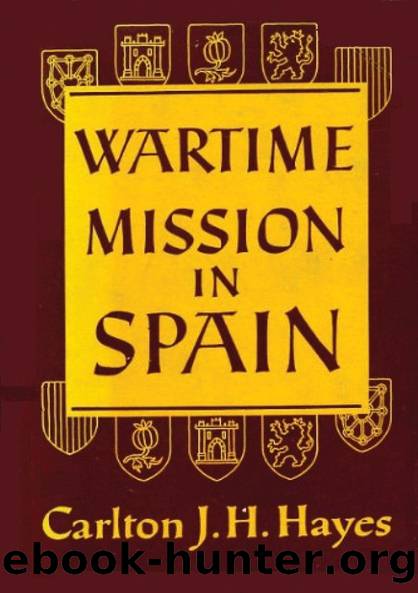Wartime Mission in Spain, 1942-1945 by Carlton J. H. Hayes

Author:Carlton J. H. Hayes [Hayes, Carlton J. H.]
Language: eng
Format: epub
Tags: History, Military, United States, Europe, General, Germany, Special Forces
ISBN: 9781787200920
Google: uY3jDAAAQBAJ
Publisher: Pickle Partners Publishing
Published: 2016-08-09T03:01:56+00:00
CHAPTER VIIâTHE WOLFRAM CRISISâNovember, 1943 to May, 1944
I
I have explained in preceding chapters how essential to the Nazi war-machine was the steel-hardening tungsten derived from wolfram ore, and how central in the Allied program of economic warfare in the Iberian Peninsula was our pre-emptive buying of this ore.{33} Germany, unlike the United States, had no wolfram of its own. It had to import it in order to continue waging war. Conceivably, it might obtain it from Russia, or from Japan. But practically, only a few tons at a time could be brought, and then most hazardously, by an occasional submarine or other blockade-runner from the Far East to Europe; and the Russian military success before Stalingrad in January, 1943, decisively removed the possibility of getting wolfram from that quarter. Consequently, Germany became almost wholly dependent on one remaining source of supply of the precious mineralâthe Iberian Peninsula. Here, the chief producer was Portugal; the secondary, Spain.
In the last chapter I have further indicated how by August, 1943, through our superior financial resources and the free competition permitted by the Spanish Government, we had driven the Germans out of the open wolfram market in Spain and limited their supply to the produce of the few mines they owned in the country besides what they could send out from previously accumulated stocks. The next step, which we all clearly envisaged, would be to persuade the Spanish Government to withhold export licenses and thus impose a practical embargo on Germanyâs getting any more wolfram from Spain. To this end, we submitted a tentative plan to Washington on October 26, 1943, and I made a preliminary approach to the Spanish Foreign Minister on October 22.{34}
Very unfortunately, in my opinion, the immediately ensuing Laurel Incident served to interrupt the logical development of negotiations, to transfer the initiative from Madrid to Washington, and, instead of proceeding along economic lines (as the Embassy urged), to make it appear that we were âdemandingâ a quick complete wolfram embargo, along with other and unrelated things, as a kind of political penalty for the Foreign Ministerâs message to Laurel.
We had, at Madrid, the greatest sympathy for, and fully shared, the ârighteous indignationâ which possessed American public opinion and the State Department over the Laurel Incident. I think, however, that, being on the spot, we saw the incident in perspective, and appreciated that it was an exception to, rather than the rule of, Spanish behavior toward us. And we doubted whether âindignation,â no matter how ârighteous,â was the most statesmanlike accompaniment of such complex and realistic negotiations as persuading Spain to embargo wolfram exports to Germany.
The State Department, in instructing me on November 6, 1943, to request of the Spanish Government âa complete and immediate embargo,â must have acted impulsively and without thinking the matter through. The instruction said I was to make the request âon any grounds you wishâ except that I was not to indicate âthat the United States contemplates any material quid pro quo.â
I obeyed instructions, of course, and duly made the request on November 10.
Download
This site does not store any files on its server. We only index and link to content provided by other sites. Please contact the content providers to delete copyright contents if any and email us, we'll remove relevant links or contents immediately.
Keeper of Genesis by Graham Hancock(1632)
Hieroglyphs: A Very Short Introduction by Penelope Wilson(1337)
The Road to Ubar by Nicholas Clapp(1184)
Rembrandt Drawings by Rembrandt(1148)
A Short History of the World in 50 Failures by Ben Gazur(1083)
The John Green Collection by Green John(1046)
Catching Fire: How Cooking Made Us Human by Richard Wrangham(999)
Forbidden Archeology's Impact: How a Controversial New Book Shocked the Scientific Community and Became an Underground Classic by Michael A. Cremo(989)
Hidden History: Lost Civilizations, Secret Knowledge, and Ancient Mysteries by Brian Haughton(903)
Primitive Mythology by Joseph Campbell(900)
Hidden History by Jim Willis(874)
The Creation of Inequality: How Our Prehistoric Ancestors Set the Stage for Monarchy, Slavery, and Empire by Kent Flannery & Joyce Marcus(873)
The History of Atlantis by Lewis Spence(812)
Neolithic by Susan McCarter(811)
Dinosaurs by Norman David;(805)
Searching for the Messiah by Barrie Wilson(785)
Ancient History from Coins by Howgego Christopher;(732)
The Ancient Giants Who Ruled America: The Missing Skeletons and the Great Smithsonian Cover-Up by Dewhurst Richard J(717)
The Christians Who Became Jews by Christopher Stroup;(713)
